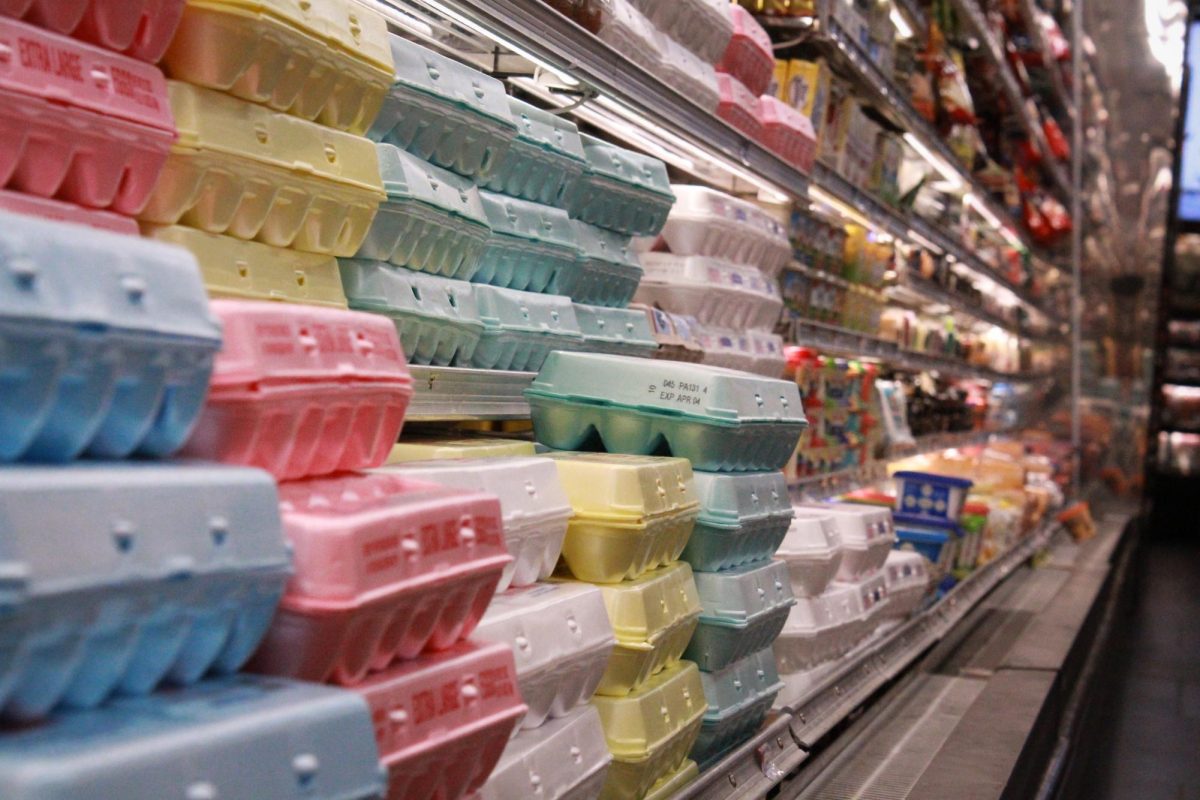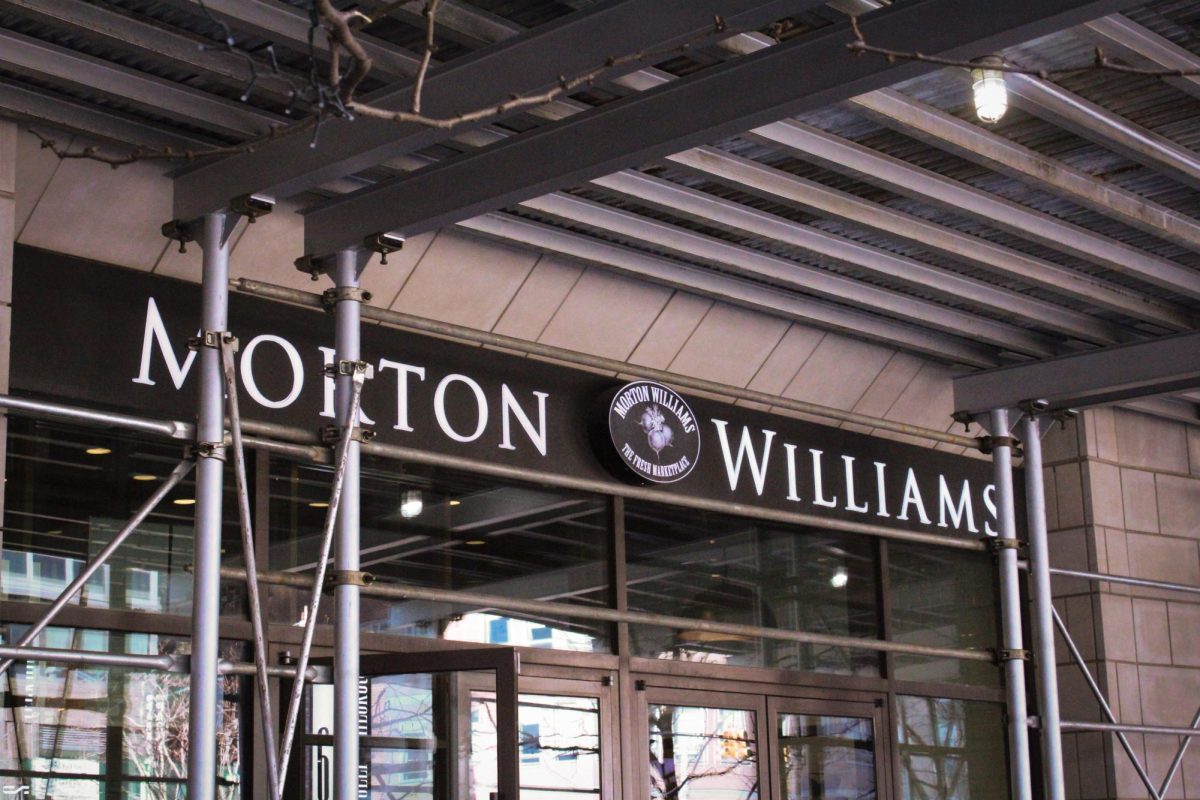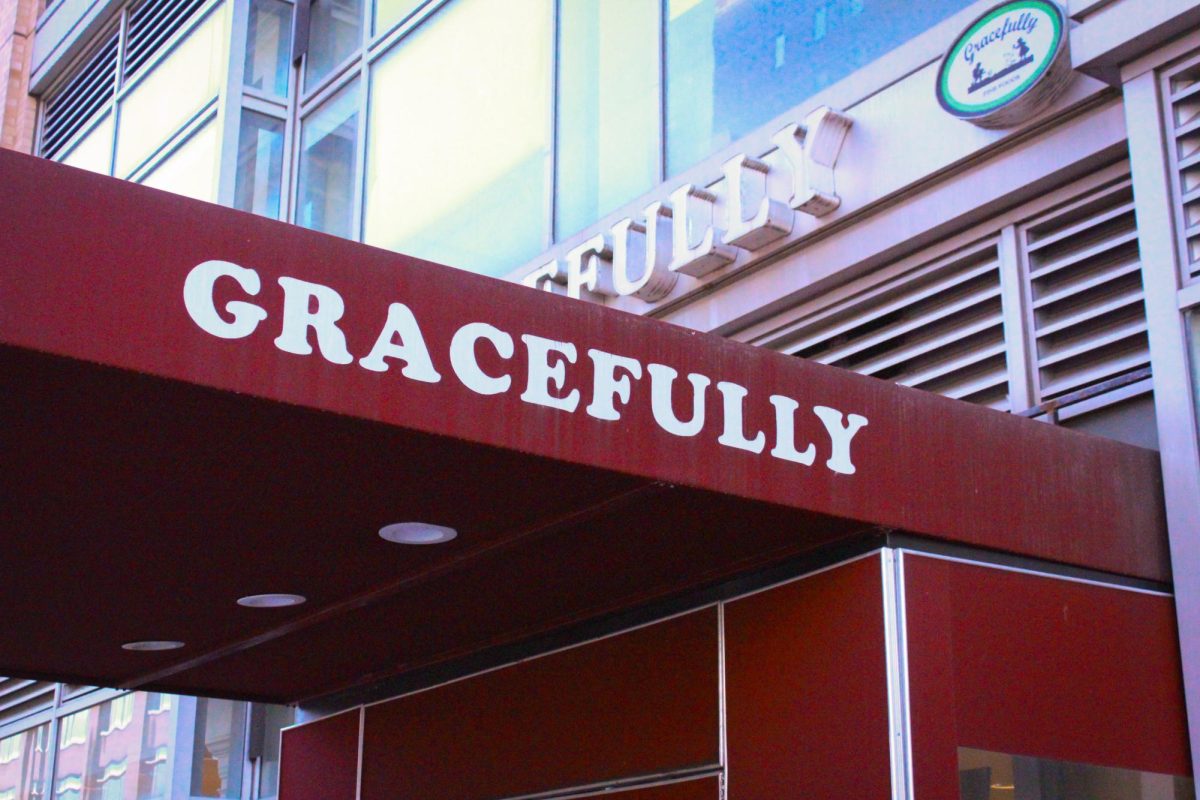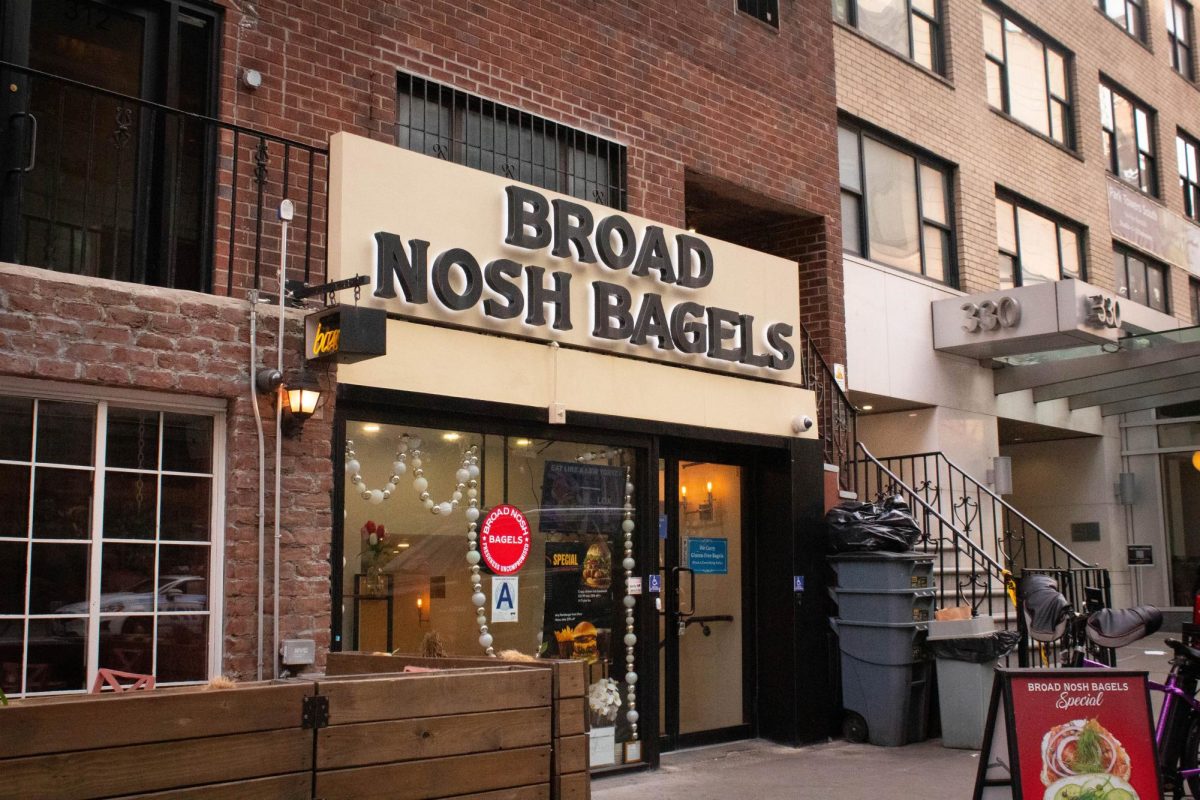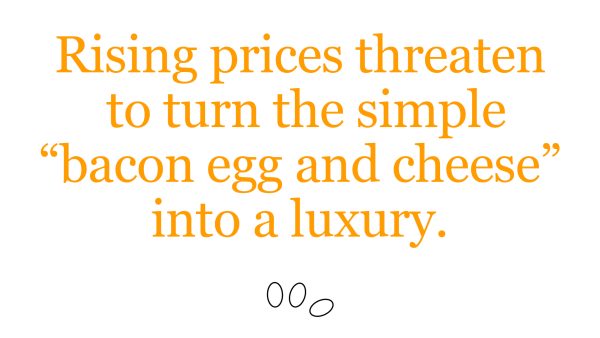
Vasileios Katsampas likes to use breakfast as a moment for quality time with his partner. They recreate Turkish eggs, or “çilbir,” a recipe they saw on TikTok. Katsampas poaches a set of eggs while his partner creates the creamy sauce base for the dish, a combination of yogurt and minced garlic. The two come together with melted butter, paprika and crushed peppers.
Katsampas, Gabelli Graduate School of Business ’26, said that eggs are an essential ingredient in his and his partner’s diet. His partner, a vegetarian, relies on eggs as their main source of protein. When Katsampas noticed egg prices rising recently, however, his habits changed. Turkish eggs were replaced by more cost-conscious breakfasts.
Katsampas is far from the only Fordham student who has had to change their diet. And actually, across Fordham’s Lincoln Center (FLC) campus and in its immediate vicinity, the prices of eggs are rising, prompting cost-conscious habit alterations.
Reporters from The Observer visited more than a dozen delis and supermarkets within a quarter-mile radius of the FLC campus (from West 57th to West 66th Street, between Central Park West/8th Avenue, and West End/11th Avenue).
This investigation found that the cheapest price for a dozen eggs was the same as the cheapest price for a bacon, egg and cheese (BEC) sandwich. Egg prices, in general, have risen dramatically, hiking prices up at supermarkets and typically prompting a $1 egg surcharge on breakfast sandwiches at locally-owned delis.

Sara Buffamanti, an adjunct faculty member in the theatre program at Fordham College at Lincoln Center (FCLC), said that New Yorkers are accustomed to high egg prices, but the recent egg ordeal has been hard to miss.
“I went to Trader Joe’s one day to buy eggs, and there were none. The entire case was empty. So that’s when I noticed that something was up,” Buffamanti said.
Inflation associated with eggs — or “eggflation” — has extended beyond Fordham and New York City. The U.S. Bureau of Labor Statistics released that egg prices, for the past decade, have been on the rise. However, there has been a stark increase in the past year, from an average $3 a dozen to an average $5.90.
The Associated Press wrote that an outbreak of bird flu is mainly to blame. To prevent the outbreak from spreading, farmers are slaughtering their egg-laying chickens. According to the U.S. Department of Agriculture, this resulted in more than 23 million chickens being slaughtered in January 2025.
Inflation of other goods, such as chicken feed, is also causing farmers to drive up the costs of eggs.
The least expensive 12-count egg carton available for purchase close to FLC is at the Morton Williams supermarket on West End Avenue between West 59th and West 60th Street.
The refrigerated dairy aisle was stocked up with an array of pastel-colored styrofoam egg cartons. The most expensive option reached over $10. But the cheapest carton did not have a sticker.
One store clerk went to check the price. He then reported that a dozen of the “Eggland’s Best” brand eggs cost $5.49.
“Es un muy buen precio, ¿no?” he remarked in Spanish.
Gracefully supermarket, on West End Avenue and West 65th Street, boasts its name on a bright red awning. The grocery store had a large selection of eggs, from a half dozen to 18-egg cartons and various brands.
The cheaper eggs, in the neighborhood of $7.99, were housed in colorful styrofoam, saying only “Grade A Eggs” or “no hormones added.” The pricier eggs touted their “pasture-raised” and “organic” status. The least expensive 12-count carton was the “Mountainside Farms” brand, priced at $7.99, while “Vital Farms” cost $13.99.
The “Vital Farms” 6-counts were the same price as the cheapest carton of a dozen eggs.
A cashier at Gracefully, Thandar, spoke about how the price of eggs had grown “a lot, more than doubled.”
When walking into the Brooklyn Fare supermarket on West End Avenue and West 62nd Street, a black piece of laminated paper greets customers.
The sign read, “due to the rising cost of eggs we are forced to raise the price of our breakfast sandwiches.”
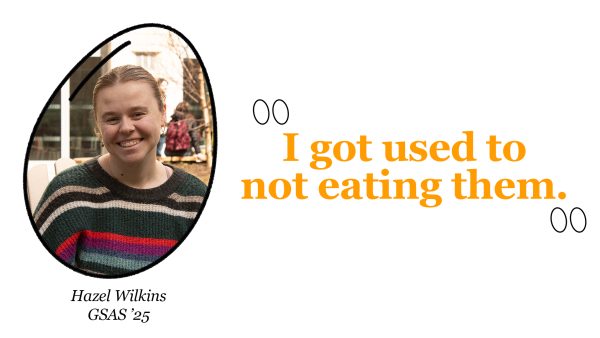
Kevin Klein, Fordham Law School ’26, pointed out the frustrating reality of the situation.
“I just paid $12 for a carton of 12 eggs,” Klein said. “I’m not proud of it, but I can’t say I wouldn’t do it again.”
Klein’s sentiment was echoed in the helpful tones of store clerks and complaints from students. However, not everyone was willing to go that far. Dylan Stern, FCLC ’28, was adamantly opposed to the idea of paying twelve dollars for eggs.
Stern said as he threw his hands up, “Oh God, I hope not. Please, no, I would not. That’s ridiculous.”
Like Stern, New Yorkers are reckoning with how much they are willing to pay for the basics.
Other students, like Hazel Wilkins, Graduate School of Arts and Sciences ’25, have given up on eating eggs altogether.
“As soon as they first went up to about $8 or $9, I stopped buying them just because I thought that they would go down. I thought I would just stop buying them after just a week or two, but then the prices never went down. So, I just have been sticking it out, I guess. I got used to not eating them,” Wilkins said.

Although Wilkins may be forgoing eggs, for New Yorkers, they are a part of an undeniable breakfast staple: BEC sandwich.
New Yorkers want something fast and convenient — something they can grab at almost any bodega or corner store for a decent price. The New York Times claims that the BEC “doesn’t divide New Yorkers by class, income or neighborhood.” But the rising prices threaten to make something as simple as a BEC into a luxury.
The Observer found that BEC prices have gone up by $1 to $3 in a matter of a few weeks. Gracefully and Riverside Gourmet Deli have made the most prominent increases. A few workers speculated customers have noticed all deli prices increasing.
The crown jewel of overpriced BECs came from Bagel Market, on 10th Avenue and West 57th Street, at $9.80. Roberto, the store’s manager, said that prices for everything, including eggs, have risen.
A sign at the cash register alerted customers to the recent increase in egg sandwich prices. The sandwich on a plain, toasted bagel costs $9.65. Until recently, that price had been a dollar less.
The sign explained the hike resulted from “unprecedented price increases in eggs.” And it consoled customers, apologizing for the inconvenience. “We are committed to our customers and providing great quality products for you,” it read.
As for Roosevelt Gourmet Deli, located on West 57th Street, the price for a BEC has also changed. Once it had been $5.49, but due to a rise in egg prices, it’s now $5.99 before 11 a.m.
The deli offers a 10% discount for Fordham students, according to the manager, Nash.
“I could reduce my price because I don’t want to charge a lot. It’s not fair,” Nash said.
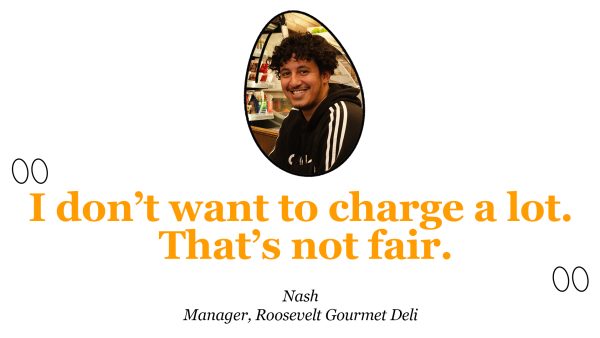
Alan’s Marketplace, the deli just across 9th Avenue from Fordham’s Leon Lowenstein Center, advertised its BEC price at $7.99.
But not every deli had felt the eggflation. At Appleton Market on West End Ave, near West 65th Street, Nina, a cashier, said that they have always only charged $1.50 for an extra egg on a sandwich.
Nina, wearing a red apron, said that the prices barely changed.
But for Katsampas, he said that rising egg prices are something he is going to have to accept.
“I mean, I need eggs,” Katsampas said.

